Medication Management in Elderly: Case Study of Marcel Lever's Care
VerifiedAdded on 2023/04/11
|7
|1175
|214
Case Study
AI Summary
This case study focuses on the medication management of Marcel Lever, a 70-year-old patient with hypertension, type 2 diabetes, and obesity. It identifies and explains medication self-management, including the importance of correct dosage, timing, and frequency. Nursing interventions such as promoting aerobic exercise and dietary changes are discussed, along with the rationales behind them, such as using ACE inhibitors and diuretics for hypertension. Strategies for evaluating nursing interventions, including monitoring BMI, blood pressure, and blood glucose levels, are outlined. The application of the clinical reasoning cycle is also detailed, from collecting cues to evaluating outcomes and reflecting on the learning process. The case study emphasizes the importance of a holistic approach to managing Marcel's health conditions through medication, lifestyle modifications, and continuous monitoring.
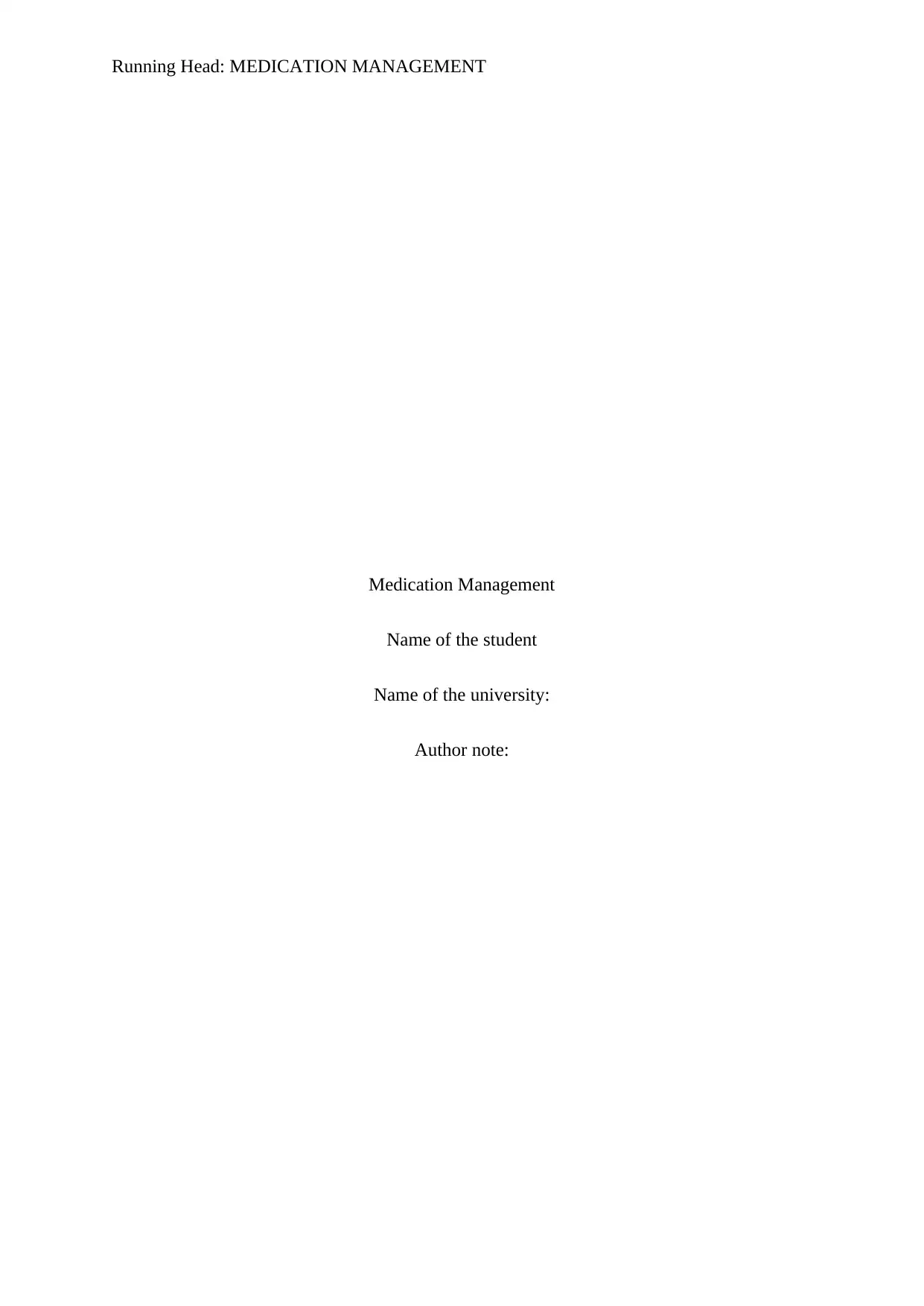
Running Head: MEDICATION MANAGEMENT
Medication Management
Name of the student
Name of the university:
Author note:
Medication Management
Name of the student
Name of the university:
Author note:
Paraphrase This Document
Need a fresh take? Get an instant paraphrase of this document with our AI Paraphraser
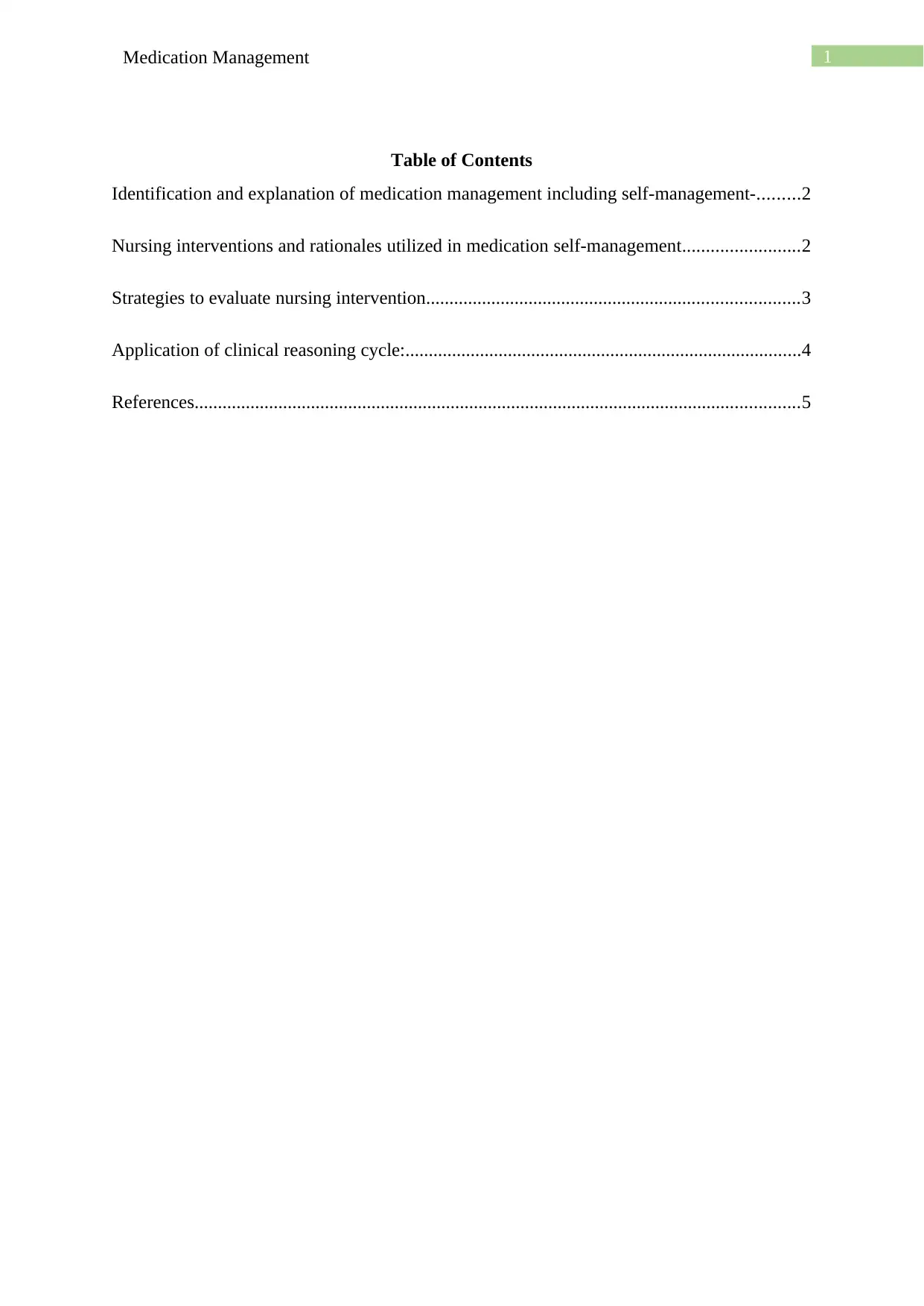
1Medication Management
Table of Contents
Identification and explanation of medication management including self-management-.........2
Nursing interventions and rationales utilized in medication self-management.........................2
Strategies to evaluate nursing intervention................................................................................3
Application of clinical reasoning cycle:.....................................................................................4
References..................................................................................................................................5
Table of Contents
Identification and explanation of medication management including self-management-.........2
Nursing interventions and rationales utilized in medication self-management.........................2
Strategies to evaluate nursing intervention................................................................................3
Application of clinical reasoning cycle:.....................................................................................4
References..................................................................................................................................5
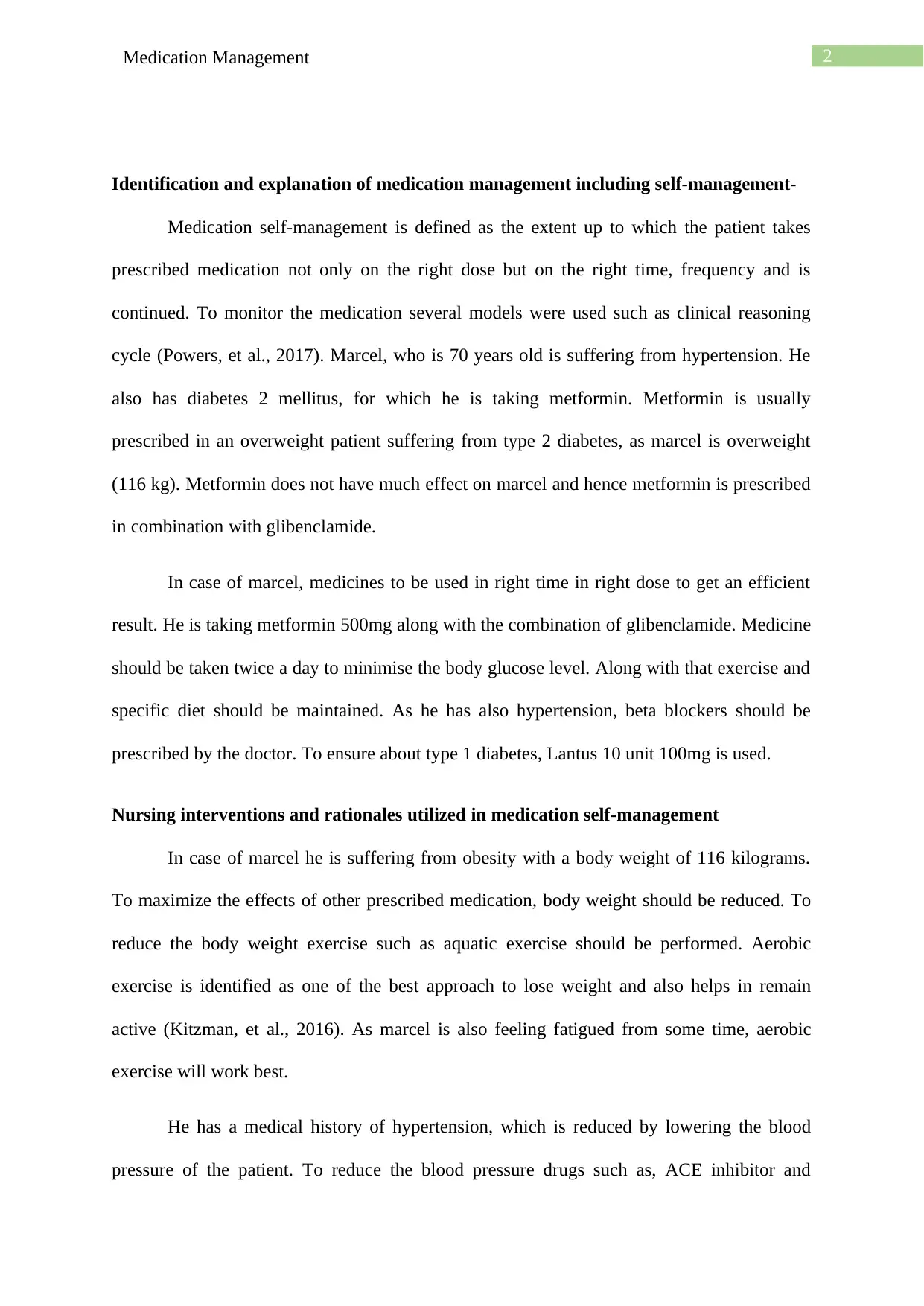
2Medication Management
Identification and explanation of medication management including self-management-
Medication self-management is defined as the extent up to which the patient takes
prescribed medication not only on the right dose but on the right time, frequency and is
continued. To monitor the medication several models were used such as clinical reasoning
cycle (Powers, et al., 2017). Marcel, who is 70 years old is suffering from hypertension. He
also has diabetes 2 mellitus, for which he is taking metformin. Metformin is usually
prescribed in an overweight patient suffering from type 2 diabetes, as marcel is overweight
(116 kg). Metformin does not have much effect on marcel and hence metformin is prescribed
in combination with glibenclamide.
In case of marcel, medicines to be used in right time in right dose to get an efficient
result. He is taking metformin 500mg along with the combination of glibenclamide. Medicine
should be taken twice a day to minimise the body glucose level. Along with that exercise and
specific diet should be maintained. As he has also hypertension, beta blockers should be
prescribed by the doctor. To ensure about type 1 diabetes, Lantus 10 unit 100mg is used.
Nursing interventions and rationales utilized in medication self-management
In case of marcel he is suffering from obesity with a body weight of 116 kilograms.
To maximize the effects of other prescribed medication, body weight should be reduced. To
reduce the body weight exercise such as aquatic exercise should be performed. Aerobic
exercise is identified as one of the best approach to lose weight and also helps in remain
active (Kitzman, et al., 2016). As marcel is also feeling fatigued from some time, aerobic
exercise will work best.
He has a medical history of hypertension, which is reduced by lowering the blood
pressure of the patient. To reduce the blood pressure drugs such as, ACE inhibitor and
Identification and explanation of medication management including self-management-
Medication self-management is defined as the extent up to which the patient takes
prescribed medication not only on the right dose but on the right time, frequency and is
continued. To monitor the medication several models were used such as clinical reasoning
cycle (Powers, et al., 2017). Marcel, who is 70 years old is suffering from hypertension. He
also has diabetes 2 mellitus, for which he is taking metformin. Metformin is usually
prescribed in an overweight patient suffering from type 2 diabetes, as marcel is overweight
(116 kg). Metformin does not have much effect on marcel and hence metformin is prescribed
in combination with glibenclamide.
In case of marcel, medicines to be used in right time in right dose to get an efficient
result. He is taking metformin 500mg along with the combination of glibenclamide. Medicine
should be taken twice a day to minimise the body glucose level. Along with that exercise and
specific diet should be maintained. As he has also hypertension, beta blockers should be
prescribed by the doctor. To ensure about type 1 diabetes, Lantus 10 unit 100mg is used.
Nursing interventions and rationales utilized in medication self-management
In case of marcel he is suffering from obesity with a body weight of 116 kilograms.
To maximize the effects of other prescribed medication, body weight should be reduced. To
reduce the body weight exercise such as aquatic exercise should be performed. Aerobic
exercise is identified as one of the best approach to lose weight and also helps in remain
active (Kitzman, et al., 2016). As marcel is also feeling fatigued from some time, aerobic
exercise will work best.
He has a medical history of hypertension, which is reduced by lowering the blood
pressure of the patient. To reduce the blood pressure drugs such as, ACE inhibitor and
⊘ This is a preview!⊘
Do you want full access?
Subscribe today to unlock all pages.

Trusted by 1+ million students worldwide
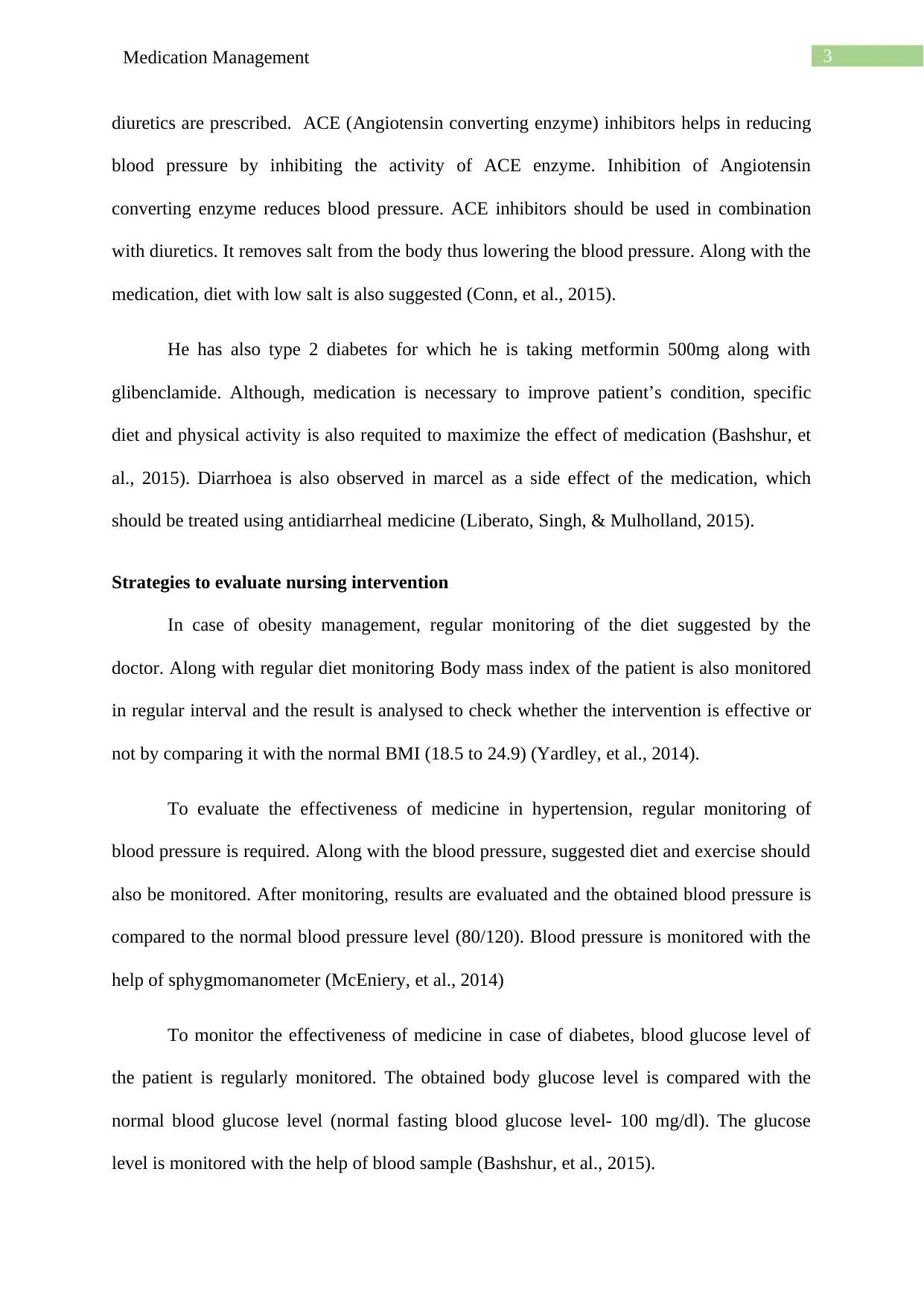
3Medication Management
diuretics are prescribed. ACE (Angiotensin converting enzyme) inhibitors helps in reducing
blood pressure by inhibiting the activity of ACE enzyme. Inhibition of Angiotensin
converting enzyme reduces blood pressure. ACE inhibitors should be used in combination
with diuretics. It removes salt from the body thus lowering the blood pressure. Along with the
medication, diet with low salt is also suggested (Conn, et al., 2015).
He has also type 2 diabetes for which he is taking metformin 500mg along with
glibenclamide. Although, medication is necessary to improve patient’s condition, specific
diet and physical activity is also requited to maximize the effect of medication (Bashshur, et
al., 2015). Diarrhoea is also observed in marcel as a side effect of the medication, which
should be treated using antidiarrheal medicine (Liberato, Singh, & Mulholland, 2015).
Strategies to evaluate nursing intervention
In case of obesity management, regular monitoring of the diet suggested by the
doctor. Along with regular diet monitoring Body mass index of the patient is also monitored
in regular interval and the result is analysed to check whether the intervention is effective or
not by comparing it with the normal BMI (18.5 to 24.9) (Yardley, et al., 2014).
To evaluate the effectiveness of medicine in hypertension, regular monitoring of
blood pressure is required. Along with the blood pressure, suggested diet and exercise should
also be monitored. After monitoring, results are evaluated and the obtained blood pressure is
compared to the normal blood pressure level (80/120). Blood pressure is monitored with the
help of sphygmomanometer (McEniery, et al., 2014)
To monitor the effectiveness of medicine in case of diabetes, blood glucose level of
the patient is regularly monitored. The obtained body glucose level is compared with the
normal blood glucose level (normal fasting blood glucose level- 100 mg/dl). The glucose
level is monitored with the help of blood sample (Bashshur, et al., 2015).
diuretics are prescribed. ACE (Angiotensin converting enzyme) inhibitors helps in reducing
blood pressure by inhibiting the activity of ACE enzyme. Inhibition of Angiotensin
converting enzyme reduces blood pressure. ACE inhibitors should be used in combination
with diuretics. It removes salt from the body thus lowering the blood pressure. Along with the
medication, diet with low salt is also suggested (Conn, et al., 2015).
He has also type 2 diabetes for which he is taking metformin 500mg along with
glibenclamide. Although, medication is necessary to improve patient’s condition, specific
diet and physical activity is also requited to maximize the effect of medication (Bashshur, et
al., 2015). Diarrhoea is also observed in marcel as a side effect of the medication, which
should be treated using antidiarrheal medicine (Liberato, Singh, & Mulholland, 2015).
Strategies to evaluate nursing intervention
In case of obesity management, regular monitoring of the diet suggested by the
doctor. Along with regular diet monitoring Body mass index of the patient is also monitored
in regular interval and the result is analysed to check whether the intervention is effective or
not by comparing it with the normal BMI (18.5 to 24.9) (Yardley, et al., 2014).
To evaluate the effectiveness of medicine in hypertension, regular monitoring of
blood pressure is required. Along with the blood pressure, suggested diet and exercise should
also be monitored. After monitoring, results are evaluated and the obtained blood pressure is
compared to the normal blood pressure level (80/120). Blood pressure is monitored with the
help of sphygmomanometer (McEniery, et al., 2014)
To monitor the effectiveness of medicine in case of diabetes, blood glucose level of
the patient is regularly monitored. The obtained body glucose level is compared with the
normal blood glucose level (normal fasting blood glucose level- 100 mg/dl). The glucose
level is monitored with the help of blood sample (Bashshur, et al., 2015).
Paraphrase This Document
Need a fresh take? Get an instant paraphrase of this document with our AI Paraphraser
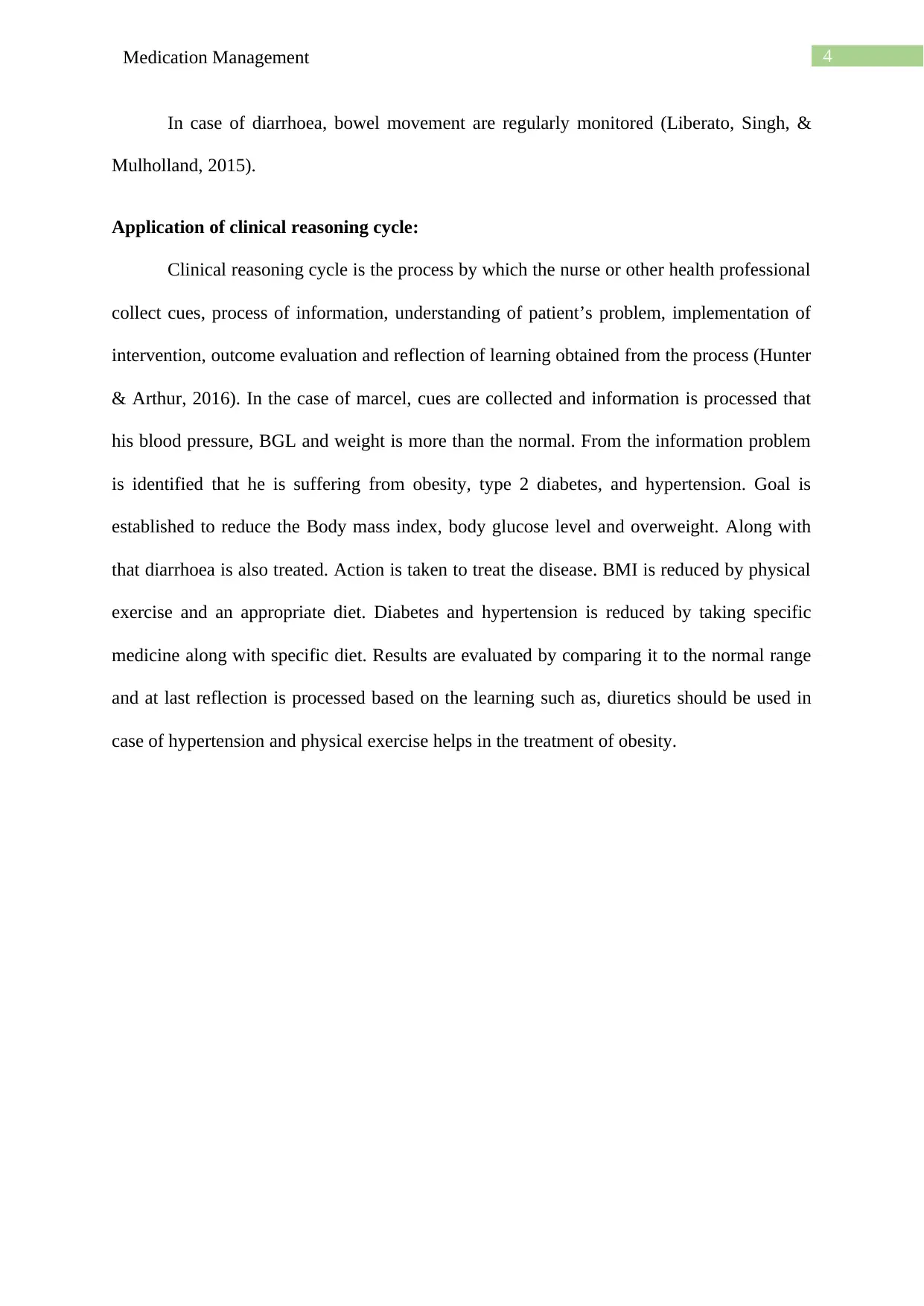
4Medication Management
In case of diarrhoea, bowel movement are regularly monitored (Liberato, Singh, &
Mulholland, 2015).
Application of clinical reasoning cycle:
Clinical reasoning cycle is the process by which the nurse or other health professional
collect cues, process of information, understanding of patient’s problem, implementation of
intervention, outcome evaluation and reflection of learning obtained from the process (Hunter
& Arthur, 2016). In the case of marcel, cues are collected and information is processed that
his blood pressure, BGL and weight is more than the normal. From the information problem
is identified that he is suffering from obesity, type 2 diabetes, and hypertension. Goal is
established to reduce the Body mass index, body glucose level and overweight. Along with
that diarrhoea is also treated. Action is taken to treat the disease. BMI is reduced by physical
exercise and an appropriate diet. Diabetes and hypertension is reduced by taking specific
medicine along with specific diet. Results are evaluated by comparing it to the normal range
and at last reflection is processed based on the learning such as, diuretics should be used in
case of hypertension and physical exercise helps in the treatment of obesity.
In case of diarrhoea, bowel movement are regularly monitored (Liberato, Singh, &
Mulholland, 2015).
Application of clinical reasoning cycle:
Clinical reasoning cycle is the process by which the nurse or other health professional
collect cues, process of information, understanding of patient’s problem, implementation of
intervention, outcome evaluation and reflection of learning obtained from the process (Hunter
& Arthur, 2016). In the case of marcel, cues are collected and information is processed that
his blood pressure, BGL and weight is more than the normal. From the information problem
is identified that he is suffering from obesity, type 2 diabetes, and hypertension. Goal is
established to reduce the Body mass index, body glucose level and overweight. Along with
that diarrhoea is also treated. Action is taken to treat the disease. BMI is reduced by physical
exercise and an appropriate diet. Diabetes and hypertension is reduced by taking specific
medicine along with specific diet. Results are evaluated by comparing it to the normal range
and at last reflection is processed based on the learning such as, diuretics should be used in
case of hypertension and physical exercise helps in the treatment of obesity.
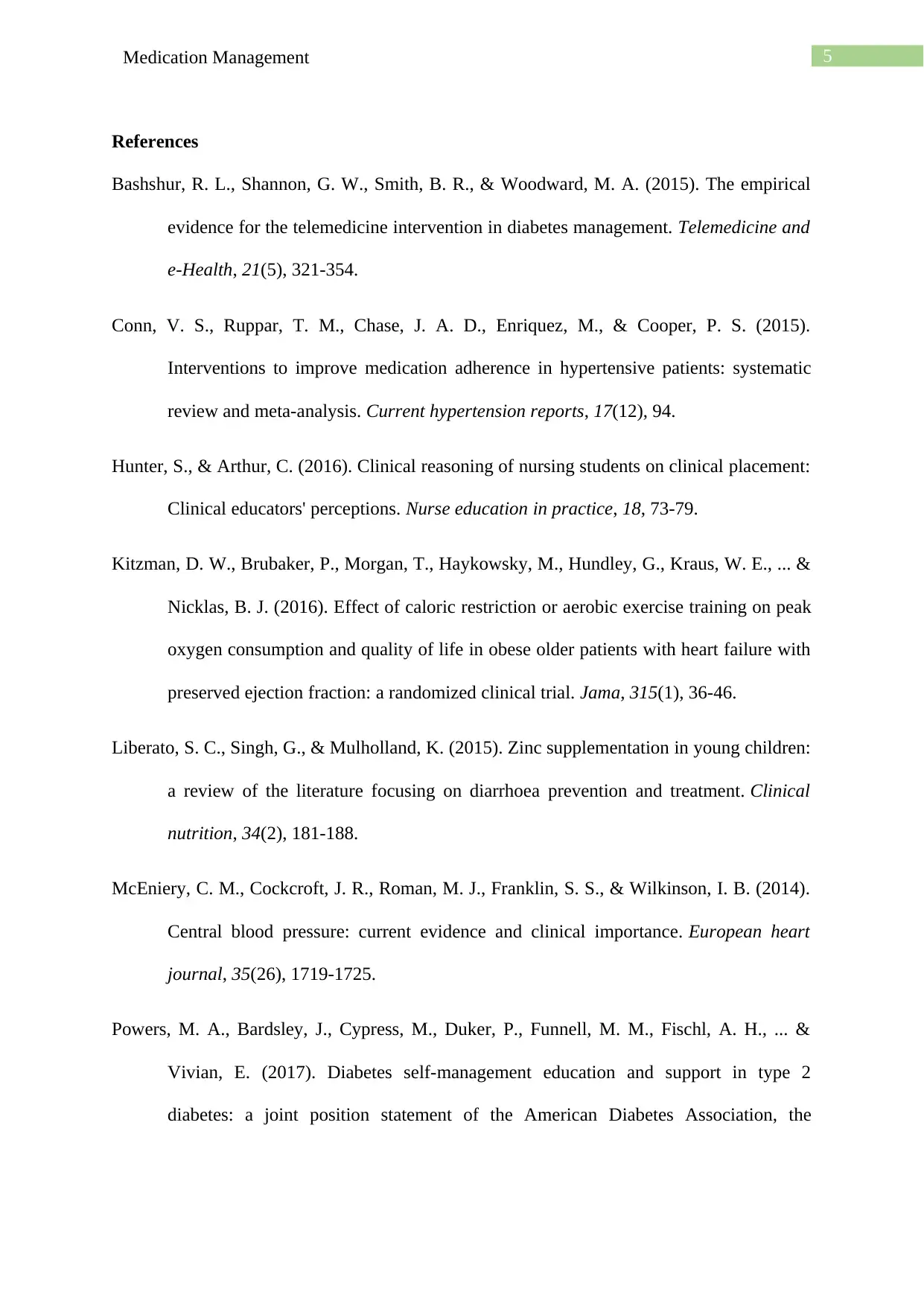
5Medication Management
References
Bashshur, R. L., Shannon, G. W., Smith, B. R., & Woodward, M. A. (2015). The empirical
evidence for the telemedicine intervention in diabetes management. Telemedicine and
e-Health, 21(5), 321-354.
Conn, V. S., Ruppar, T. M., Chase, J. A. D., Enriquez, M., & Cooper, P. S. (2015).
Interventions to improve medication adherence in hypertensive patients: systematic
review and meta-analysis. Current hypertension reports, 17(12), 94.
Hunter, S., & Arthur, C. (2016). Clinical reasoning of nursing students on clinical placement:
Clinical educators' perceptions. Nurse education in practice, 18, 73-79.
Kitzman, D. W., Brubaker, P., Morgan, T., Haykowsky, M., Hundley, G., Kraus, W. E., ... &
Nicklas, B. J. (2016). Effect of caloric restriction or aerobic exercise training on peak
oxygen consumption and quality of life in obese older patients with heart failure with
preserved ejection fraction: a randomized clinical trial. Jama, 315(1), 36-46.
Liberato, S. C., Singh, G., & Mulholland, K. (2015). Zinc supplementation in young children:
a review of the literature focusing on diarrhoea prevention and treatment. Clinical
nutrition, 34(2), 181-188.
McEniery, C. M., Cockcroft, J. R., Roman, M. J., Franklin, S. S., & Wilkinson, I. B. (2014).
Central blood pressure: current evidence and clinical importance. European heart
journal, 35(26), 1719-1725.
Powers, M. A., Bardsley, J., Cypress, M., Duker, P., Funnell, M. M., Fischl, A. H., ... &
Vivian, E. (2017). Diabetes self-management education and support in type 2
diabetes: a joint position statement of the American Diabetes Association, the
References
Bashshur, R. L., Shannon, G. W., Smith, B. R., & Woodward, M. A. (2015). The empirical
evidence for the telemedicine intervention in diabetes management. Telemedicine and
e-Health, 21(5), 321-354.
Conn, V. S., Ruppar, T. M., Chase, J. A. D., Enriquez, M., & Cooper, P. S. (2015).
Interventions to improve medication adherence in hypertensive patients: systematic
review and meta-analysis. Current hypertension reports, 17(12), 94.
Hunter, S., & Arthur, C. (2016). Clinical reasoning of nursing students on clinical placement:
Clinical educators' perceptions. Nurse education in practice, 18, 73-79.
Kitzman, D. W., Brubaker, P., Morgan, T., Haykowsky, M., Hundley, G., Kraus, W. E., ... &
Nicklas, B. J. (2016). Effect of caloric restriction or aerobic exercise training on peak
oxygen consumption and quality of life in obese older patients with heart failure with
preserved ejection fraction: a randomized clinical trial. Jama, 315(1), 36-46.
Liberato, S. C., Singh, G., & Mulholland, K. (2015). Zinc supplementation in young children:
a review of the literature focusing on diarrhoea prevention and treatment. Clinical
nutrition, 34(2), 181-188.
McEniery, C. M., Cockcroft, J. R., Roman, M. J., Franklin, S. S., & Wilkinson, I. B. (2014).
Central blood pressure: current evidence and clinical importance. European heart
journal, 35(26), 1719-1725.
Powers, M. A., Bardsley, J., Cypress, M., Duker, P., Funnell, M. M., Fischl, A. H., ... &
Vivian, E. (2017). Diabetes self-management education and support in type 2
diabetes: a joint position statement of the American Diabetes Association, the
⊘ This is a preview!⊘
Do you want full access?
Subscribe today to unlock all pages.

Trusted by 1+ million students worldwide
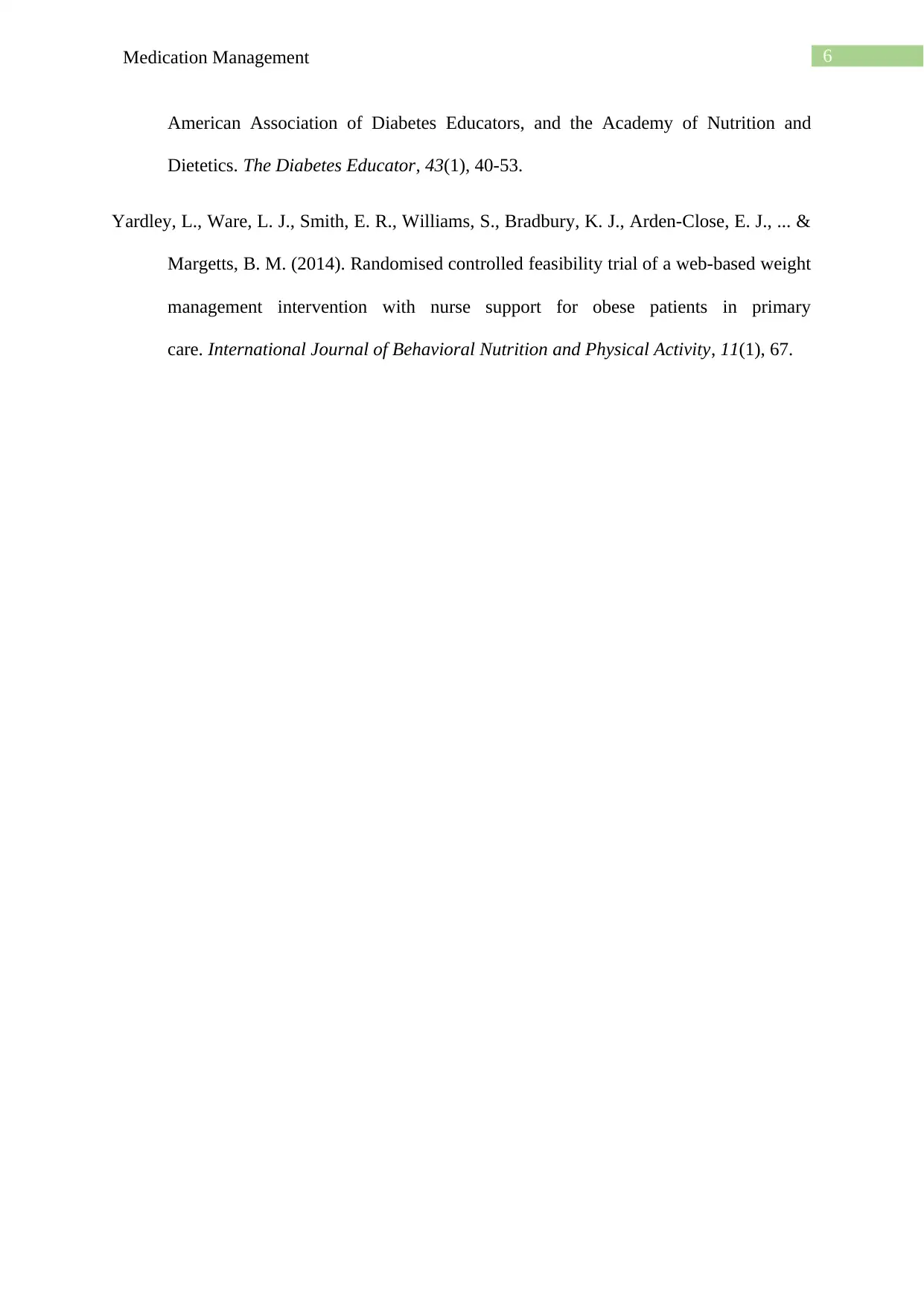
6Medication Management
American Association of Diabetes Educators, and the Academy of Nutrition and
Dietetics. The Diabetes Educator, 43(1), 40-53.
Yardley, L., Ware, L. J., Smith, E. R., Williams, S., Bradbury, K. J., Arden-Close, E. J., ... &
Margetts, B. M. (2014). Randomised controlled feasibility trial of a web-based weight
management intervention with nurse support for obese patients in primary
care. International Journal of Behavioral Nutrition and Physical Activity, 11(1), 67.
American Association of Diabetes Educators, and the Academy of Nutrition and
Dietetics. The Diabetes Educator, 43(1), 40-53.
Yardley, L., Ware, L. J., Smith, E. R., Williams, S., Bradbury, K. J., Arden-Close, E. J., ... &
Margetts, B. M. (2014). Randomised controlled feasibility trial of a web-based weight
management intervention with nurse support for obese patients in primary
care. International Journal of Behavioral Nutrition and Physical Activity, 11(1), 67.
1 out of 7
Related Documents
Your All-in-One AI-Powered Toolkit for Academic Success.
+13062052269
info@desklib.com
Available 24*7 on WhatsApp / Email
![[object Object]](/_next/static/media/star-bottom.7253800d.svg)
Unlock your academic potential
Copyright © 2020–2025 A2Z Services. All Rights Reserved. Developed and managed by ZUCOL.





